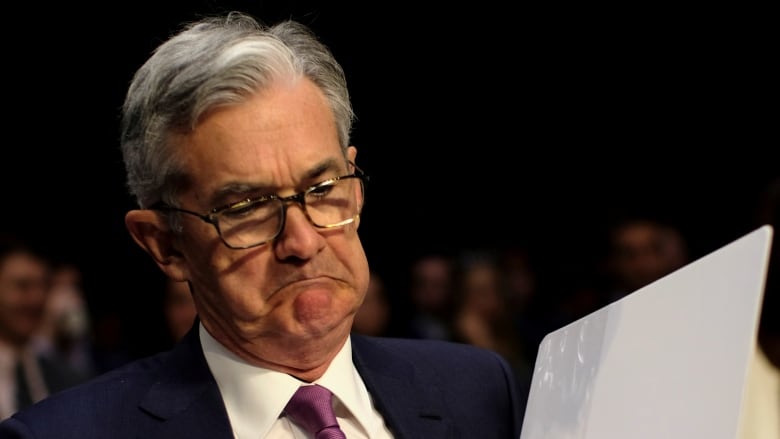Federal Reserve boss tells Congress to get its house in order: Don Pittis
Jerome Powell lets senators know it's their job, not his, to solve trade and employment problems

The world's most powerful central banker, U.S. Fed chair Jerome Powell, says strong inflation and low unemployment mean the country's economic boom is set to continue.
But when grilled yesterday by members of the Senate banking committeeabout the economicrisks of trade wars and stagnating wages for the poorest Americans, he returned fire.
In wide-ranging testimony on the economy that went from the shocking effect of tariffs on agriculturalpricesto the impact of the opioid crisis on the workforce,Powell repeatedly pointed out what was within and outside the Federal Reserve's remit.
"These are unhealthy trends in the U.S. economy that we don't have the tools to fix," he said. "We don't have those tools. You have those tools."
As usual in congressional hearings, many of the senators appearedmore interested in promoting their partisan views than actually getting the Fed chair's answer, often cutting him off after he'd begun to respond.
With a larger-than-usual audience watchingfor clues on Powell's reading of the economy, the senators used their questions to nail their own colours to the mast, sometimes trying to get the Fed chair to agree with their point of view.

Powell was frankbut also careful to make it very clear when the issues were beyondthecentral bank's responsibility.
Repeatedly asked about the negative impact of a trade war on the economy, he said there are few signs so far that tariffs have had any damaging effect on jobs or growth.
"I have to start by saying I'm really firmly committed to staying in our lane and, you know, our lane is the economy," he said."Trade is really the business of Congress, and Congress has delegated some of that to the administration."
No-nonsense
Butin his no-nonsense way, Powell made it quite clear where he stood on President Donald Trump's protectionist strategy.
"Countries that have remained open to trade, that haven't erected barriers including tariffs, have had higher incomes, higher productivity," he said."And countries that have gone in a more protectionist direction have done worse."
After one senator pointed out that farmers in his state are getting less thanthe cost of production for crops such assoybeans and corn, Powell said the issue is whether they are victims ofa short-term negotiating strategy that would actually serve to bring tariffs down. That, he said, could be good for the economy.
But agricultural tariffs that last longer, say a matter of years, would hurt.
"Certainly it would be very tough on the ruralcommunities and, you know, I think we'd feel that at the national level, too."

Several senators, including Democrat Elizabeth Warren, who is mooted as a potential presidential candidate, gave Powell a tongue-lashing.In her case, it was over large bank profits and inadequate regulation, but she gave him little time for a fullresponse.
Some of Powell's most revealing testimony came in response to questions about the state of the country's fractured labour force, where wageshave stagnated and many"prime-age males," as he called them, have become addicted to opioids.
Human tragedy
Quoting the figure that 44 per cent of men ages 25 to 54not in the workforce are taking painkillers, Powell revealed the humanside behind his severe central banker's exterior.
"You know, it's a terrible human tragedy for many communities,certainly for the individuals and their families," he testified.
"Also, it matters a lot for labour force participation."

Many senators expressed concernthat while wages have been rising at 2.3 per cent,inflation was2.9 per cent this month, resulting in a net decline in real spending power. Powell said the trendshown by core inflation leaving out prices for more volatile goods like gasoline is more moderate.
And, of course, with the blunt toolat the central bank's disposal, all Powell can do isadjustinterest rates to try to maximise total employment.
Market theory might say full employment and the shortage of workersit creates should eventually push wages higher, but the Federal Reserve doesn't control how income is distributed. Nor does it set the minimum wage.
And while the Fed has shown it has succeeded in its twocongressional mandates to create jobs and keep thedollar stable Powell says the U.S. economy faces a series of unhealthy trends that are alsooutside the bank's control, includingan aging workforce, low social mobility and a maleprime-age labour participation rate that has been shrinking for 60 years.
The reasons for those trendsare complex, but when pinned down by Sen. Bob Corker of Tennessee, Powell narrowed it to one main cause: Stagnating educational achievement.
"When U.S. educational attainment was rising, technology was coming in, it was looking for more skills,"Powell testified, explaining the U.S. has lost its lead. "You had productivity rising, you had incomesrising, inequality decliningover a long period of time.
"U.S. educational attainment flattened out in the 1970s and everywhere else in the world it's been going up."
Follow Don on Twitter @don_pittis












_(720p).jpg)


 OFFICIAL HD MUSIC VIDEO.jpg)
.jpg)



























































































